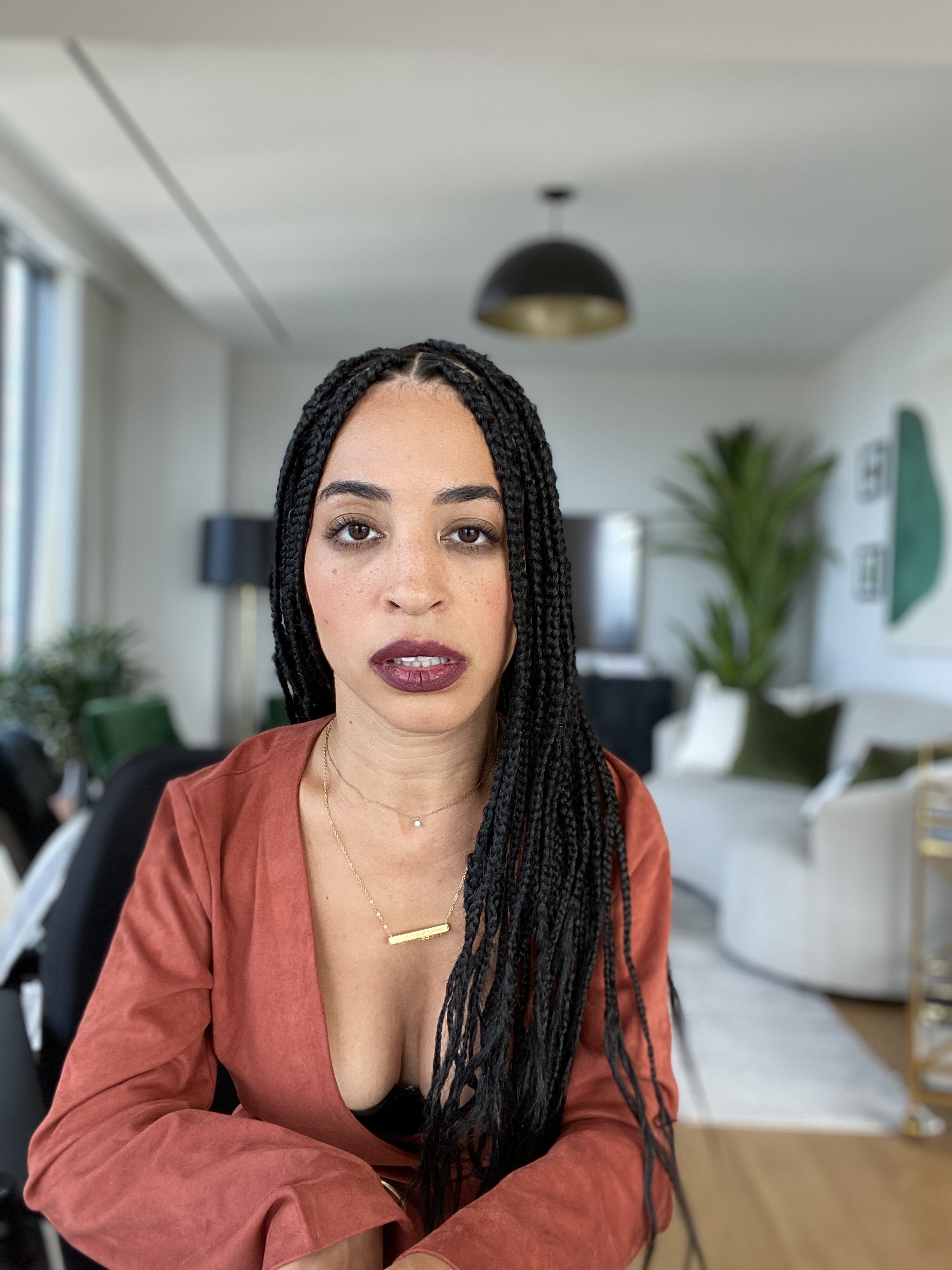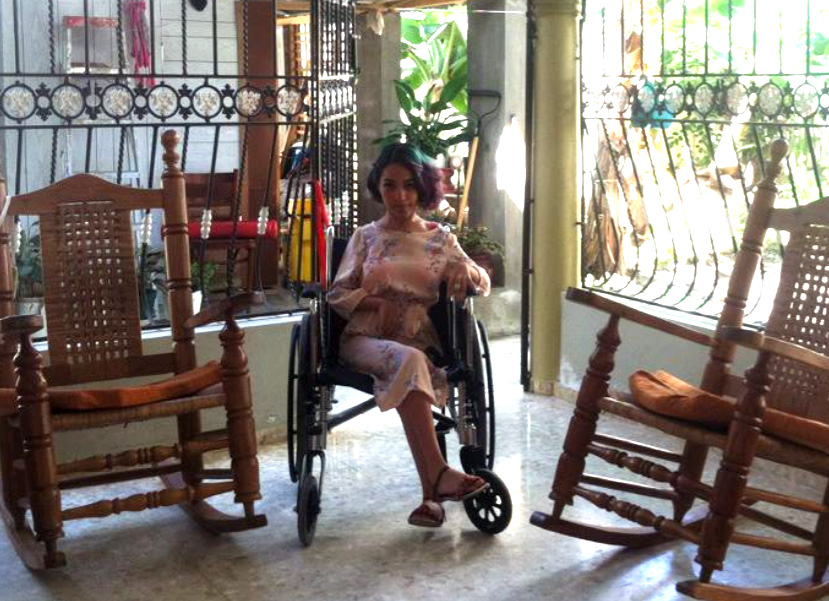She always had an interest in fashion: collecting magazines, watching runway shows on FashionTV, and grew up observing her mother who worked in the city’s Garment District sew at home. But her big break came when then-creative director Nicola Formichetti cast her in a Diesel campaign in 2014.
It was a big moment for representation, as people who have disabilities make up 25 percent of our nation’s population. A quarter of people who have historically been erased by ableism in our country would finally be able to identify with someone in an ad. It was more than just a campaign.
She has since appeared in Beyoncé’s merchandise campaign for the “Formation” tour, in ads for Olay, Calvin Klein fragrance, Nordstrom, Target and Tommy Hilfiger, countless fashion editorials, and did her first runway show for The Blonds. Now, she’s got a role in television on Showtime’s “The L Word: Generation Q” and there’s much more to come.
“I am what I am, and I can’t remove that from myself,” she said. “Take it or leave it, but I’m staying, making it known, and leaving behind my legacy.”
What are your thoughts on the current state of Latinxs in the fashion industry, and how can we empower and make room for diversity in the pipeline?
We’re seeing a huge rise of Latinx culture in the American market where we’re coming in as we are without being influenced the other way around. For safety and security, a lot of us did give in to their perceptions, but we’re at a point where we’ve had enough.
I saw the rulebook that was given to me as a Black woman, a Latina, as someone who is disabled and queer. I see what you got, and I don’t agree with this, but let me play the game until you’re blindsided by me.
Social media helps a lot where we’re connecting with other Latinxs that are in the same boat that don’t want to lose our culture. Invite our culture in but do it through our voices. We’ll do it so beautifully that you’ll have no choice but to want to be a part of our group. We’ll invite you, but you’ve got to respect it. We’re such a familia based culture so we’ll invite anyone, but the second you try it, you’re not invited anymore.
Latinxs is an all-encompassing label that includes an incredibly diverse group of people across many races, ethnicities, and physical abilities. How can we make sure we are honoring all the walks of life that make up our community?
It starts with the acknowledgement how whitewashed the Latinx community can be. That’s like realizing you need therapy. I think a lot of Latinxs don’t want to talk about it because it’s a tough topic to realize that we can have racist tendencies, even as someone who is Latina who has also been suppressed as well.
It also has to do with representation. A lot of telenovelas and news channels are responsible for the lack of realness. There are so many intersectionalities of the Latinx community that Latinx entertainment don’t talk about; and when they do, it’s the same way they talk about disabilities – erasing it, downgrading it and brainwashing viewers.
White Latinxs need to invite someone that does not look like them and give others the opportunity to sit at the table. We are out there. People must be willing to find them and give them their opportunity.
How has Latinidad influenced your work and been a part of your story, including both successes and failures, and does it actively play a role in your decision making processes today?
Early on, a lot of us who are Latinx were very scared to embrace our culture in order to fit into a mold that was never designed for us – not even a little bit. We’re struggling trying to fit into this box, turning it around and putting some glitter on it, but no matter what, we didn’t fit because it wasn’t ours.
It’s a privilege to be in a position where I am now that I can reject the box and create my own and start fresh and new. Everything that I do I always try to put in a little bit of spice to bring my culture in it. It can be something as small as my hair, saying something in Spanish during an interview, or talking about being Dominican.
I’ve had situations where people ruined my hair because they fail to realize that its multi-dimensional in textures. The worst part is to be blamed for the hair you have. At the beginning it’s a scary thing to confront it, but you’re only as good as your team. Like my hair, I’m a multi-dimensional person and we’re going to respect the whole thing.
You always need to give back to your community. There’s a lot of times I get assistive devices, that can be a walker, a wheelchair, or anything that can help me as far as my disability to be a little more independent. If I’ve outgrown them, I’ll send them home to the Dominican Republic to make sure someone can get it – for free. You must help out and save one for your people. That’s how we grow and become a better community.
Why is it important to be proud of our Latinidad, and why is it important for us to celebrate and observe Latinx Heritage Month?
We’re spice of the world. We bring culture, stories, histories and truth. We bring music and happiness even when times are in the worst shape possible. We bring culture. It’s so important to keep that alive in the generations to come and to honor the ancestors that are guiding the way and showing them that where I am today is because of them.
This month is a celebration of all those people who took that shovel, went out to the streets, and dug that path for us when there was no path to be seen. It’s hard to imagine a future with no opportunity or representation when you know in your soul you belong there.
Even amongst the celebration, we must also understand the hardship and difficulties that we still need to overcome. Policy is still affecting us severely like immigration. We’re not going anywhere, even if you put in cages or build a wall, we will still be out here breaking free, feeding you, loving you, even when you don’t want it.
This month is like a family reunion. The foundation of it is based on love and that’s important to remember. At the end of the day, we love each other and come together no matter what.
Editor’s Note: This feature is part of an ongoing editorial series celebrating Latinxs in fashion during National Latinx Heritage Month. Click here to access the series.





